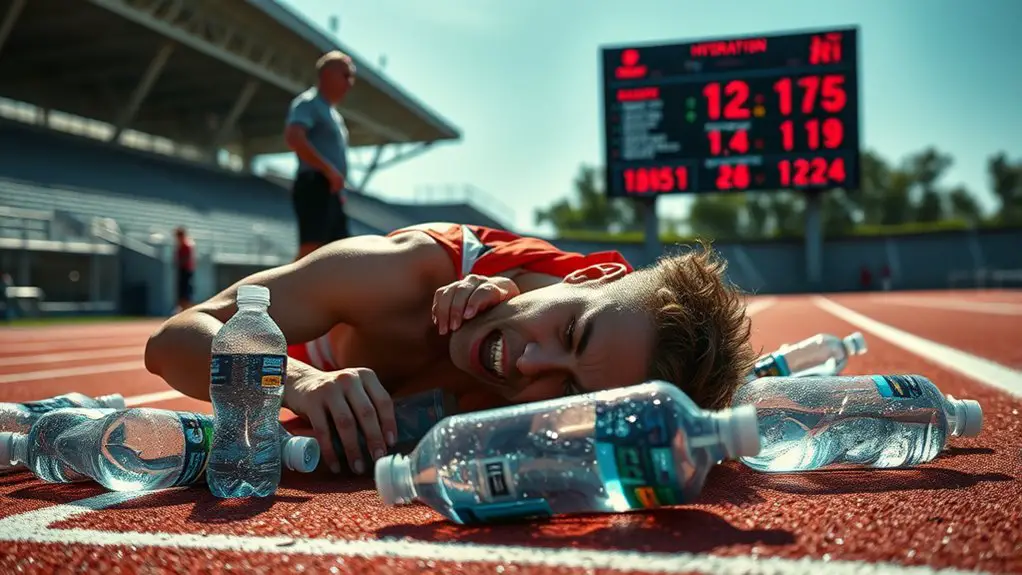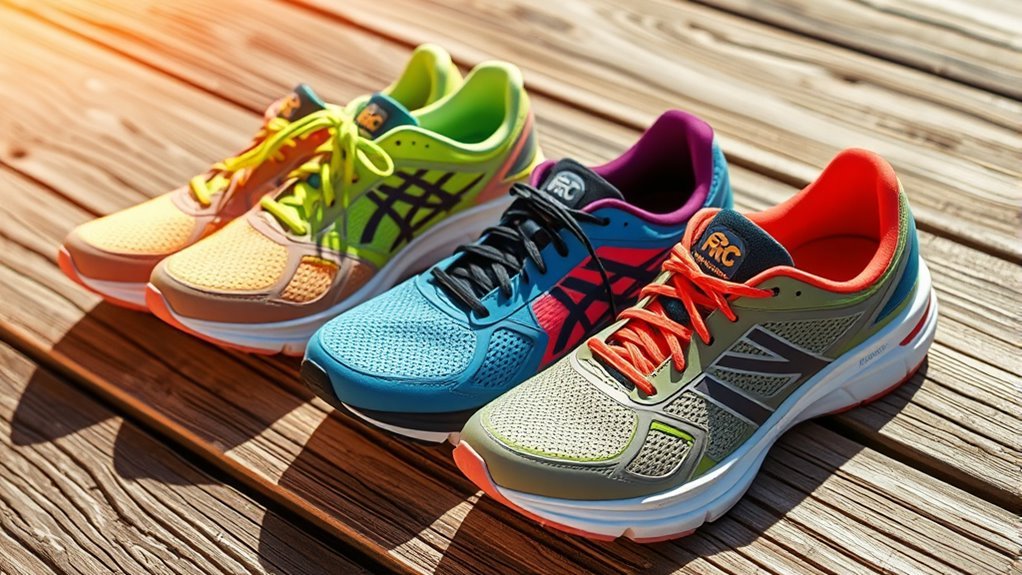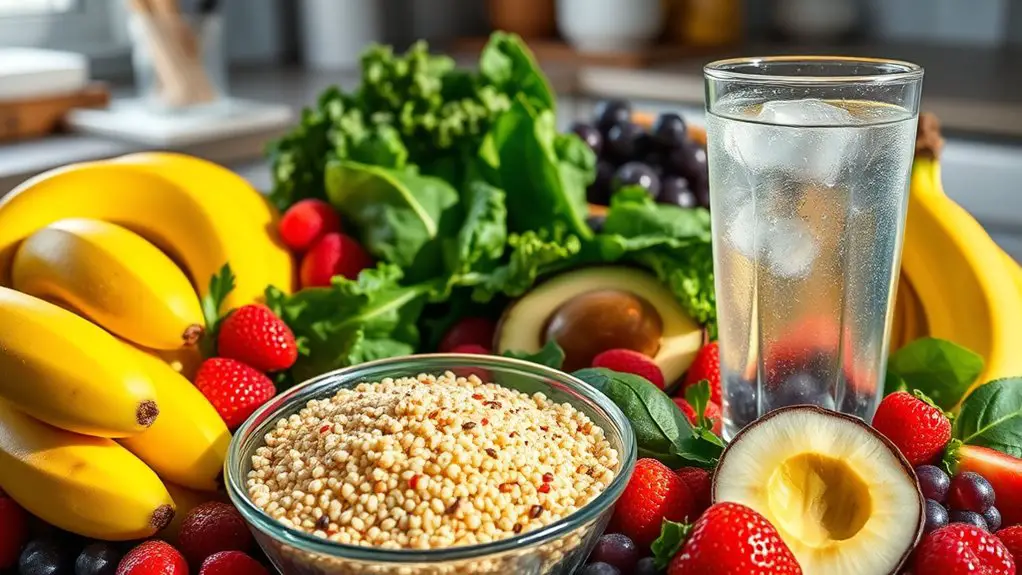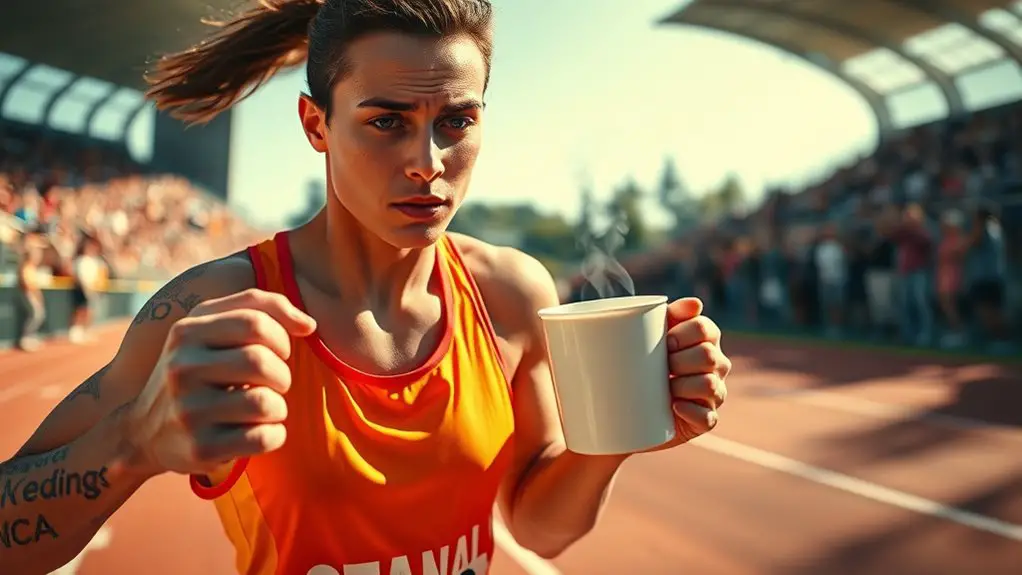Overhydration in sports can be dangerous, leading to dangerously low sodium levels, known as hyponatremia. Symptoms like nausea, headaches, and swelling signal problems caused by excessive fluid intake. It's easy to overlook personal hydration needs, especially under competitive pressure or in hot conditions. You must balance fluid intake with electrolyte replenishment to avoid complications. Understanding these factors can help you stay safe and perform at your best, and there's more to discover about safe hydration practices.
Understanding Hyponatremia
While staying hydrated is essential for athletic performance, excessive fluid intake can lead to hyponatremia, a condition where sodium levels in your blood become dangerously low. This imbalance can leave you feeling weak and disoriented, robbing you of the freedom to perform at your best. You might think that drinking more water is always better, but too much can dilute the crucial electrolytes your body needs. Recognizing the signs—like nausea, headaches, or confusion—can empower you to make informed choices about your hydration. Balancing fluid intake with electrolyte replenishment allows you to thrive without the risks. Remember, true freedom in sports comes from understanding your body's needs and making choices that support your performance, not hinder it. Stay informed and stay free!
Causes of Overhydration
Overhydration can occur when athletes drink excessive amounts of fluids, often driven by a desire to stay hydrated or fueled by the belief that more water is always better. Factors contributing to this dangerous habit include competitive pressure, misleading hydration guidelines, and a lack of awareness about personal hydration needs. Here's a quick look at common causes:
| Cause | Description | Impact on Hydration |
|---|---|---|
| Competitive Pressure | Athletes feel the need to outperform others | Leads to excessive fluid intake |
| Misleading Guidelines | Outdated or inaccurate hydration advice | Encourages overconsumption of water |
| Lack of Awareness | Ignorance about personal hydration needs | Results in neglecting body signals |
| Habitual Drinking | Drinking fluids out of routine | Increases risk of overhydration |
| Social Influence | Peer pressure to drink more | Can lead to unhealthy hydration habits |
Stay informed and trust your body!
Symptoms of Overhydration
Recognizing the symptoms of overhydration is essential for athletes to maintain peak performance and health. If you're drinking too much water, you might experience nausea, headaches, or confusion. You could feel bloated, and your body may swell, especially in your hands and feet. Fatigue may set in, making it tough to push through your training. Additionally, you might notice frequent urination, which can be a sign that your body's struggling to manage fluid levels. These symptoms can hinder your performance and overall well-being. It's crucial to listen to your body and stay in tune with its signals. Being aware of these signs can help you enjoy the freedom of your sport without the risk of overhydration.
Risk Factors for Athletes
Athletes should be aware of various risk factors that can lead to overhydration, especially during intense training or competition. Understanding these factors can help you maintain ideal hydration levels without going overboard. Here are some key risk factors to take into account:
| Risk Factor | Description |
|---|---|
| High Sweat Rates | Excessive sweating leads to fluid loss. |
| Endurance Events | Long-duration activities increase fluid intake. |
| Hot and Humid Conditions | Environmental factors can prompt overdrinking. |
| Lack of Awareness | Ignoring thirst cues can lead to excess consumption. |
The Role of Electrolytes in Hydration
Electrolytes play a crucial role in maintaining proper hydration and overall bodily function during physical activity. When you sweat, you lose not just water but also essential minerals like sodium, potassium, and magnesium. These electrolytes help regulate fluid balance, nerve function, and muscle contractions. If you're not replenishing them, you might experience fatigue, cramping, or even confusion, which can seriously impact your performance. It's all about balance; too few electrolytes can lead to dehydration, while too many can cause overhydration. So, whether you're hitting the trails or the gym, keep in mind that staying hydrated isn't just about water—it's about finding the right mix of fluids and electrolytes to keep you feeling free and energized.
Guidelines for Proper Hydration
Maintaining the right balance of fluids and electrolytes is key to effective hydration in sports. To make sure you're on track, consider these guidelines:
| Activity Level | Fluid Intake | Electrolyte Source |
|---|---|---|
| Light Exercise | 500-700 mL/hour | Water |
| Moderate Exercise | 700-1,200 mL/hour | Sports drinks or coconut water |
| Intense Exercise | 1,200-1,500 mL/hour | Electrolyte tablets or gels |
Listen to your body's thirst signals and adjust your intake accordingly. If you're sweating heavily, increase your electrolyte consumption. Remember, staying hydrated doesn't mean drowning yourself; it's all about finding that sweet spot for peak performance and freedom on the field.
Recognizing the Signs of Overhydration
How can you tell if you're overhydrating during intense training? It's essential to listen to your body. Recognizing the signs early can prevent serious issues and keep your spirit free. Here are some symptoms to watch for:
- Nausea and vomiting: Feeling queasy might mean you've crossed the hydration line.
- Headaches: Throbbing pain can signal an imbalance in electrolytes.
- Swelling: Look out for puffiness, especially in your hands and feet.
If you notice any of these signs, it's time to reassess your fluid intake. It's all about balance—hydration should empower your performance, not hinder it. Stay aware, stay free, and keep pushing your limits safely!
Case Studies and Real-Life Examples
While many athletes focus on hydration during intense training, real-life examples reveal the dangers of overhydration that can arise when boundaries are pushed too far. Take the case of a college runner who, in a bid to stay ahead, consumed excessive amounts of water before a race. Instead of enhancing performance, she experienced severe headaches and confusion, leading to her withdrawal from the competition. Another unfortunate example involves a marathon runner who faced life-threatening hyponatremia after gulping down liters of fluid, believing it would fuel her endurance. These incidents underscore how the desire for freedom in athletic performance can backfire, reminding you that moderation and awareness are key to maintaining that freedom while keeping your health intact.
Strategies for Safe Hydration Practices
To guarantee you're hydrating safely during sports, it's vital to strike the right balance between fluid intake and your body's needs. Here are some strategies to help you manage your hydration effectively:
- Listen to Your Body: Pay attention to thirst cues, and drink when you're thirsty rather than following a strict schedule.
- Monitor Urine Color: A light yellow color indicates proper hydration, while dark urine means you need to drink more.
- Electrolyte Balance: Consider sports drinks during intense activities to replenish lost electrolytes, especially in hot conditions.
Frequently Asked Questions
Can Children Experience Overhydration During Sports Activities?
Yes, children can experience overhydration during sports activities. It's important to monitor their fluid intake, ensuring they drink when thirsty rather than forcing extra water, as it could lead to imbalances and health issues.
How Does Temperature Affect Hydration Needs in Athletes?
You might think that scorching heat means you need less water, right? Ironically, higher temperatures actually increase your hydration needs. So, keep sipping that water to stay cool and perform your best, even in the heat!
Is It Possible to Overhydrate While Swimming?
Yes, you can overhydrate while swimming. Even though you're surrounded by water, your body still needs balance. If you drink too much, you might experience discomfort or health issues. Listen to your body's signals!
Do Certain Sports Have Higher Risks of Overhydration?
Isn't it interesting how some sports can lead to overhydration more than others? Endurance activities like marathons or triathlons often pose higher risks, so staying aware of your hydration needs is essential for your performance.
Can Caffeine Impact Hydration Levels in Athletes?
Caffeine can influence hydration levels by acting as a mild diuretic, but its effects vary. While it might lead to increased urine production, moderate consumption typically won't markedly impact your overall hydration status during activity.




